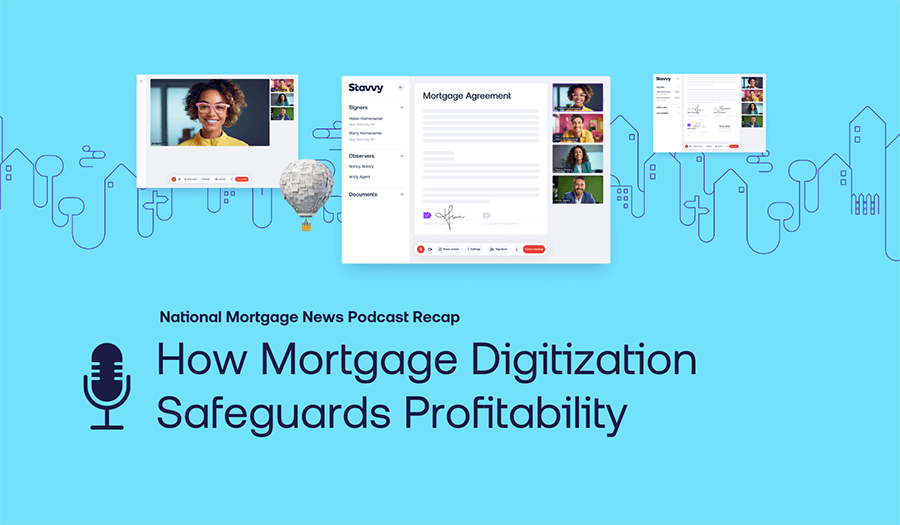Remote online notarization (RON) has reached a tipping point.
During the pandemic, states passed emergency legislation allowing RON use, and many have created permanent laws since then.
RON allows real estate professionals to witness document signing using video technology remotely. Virtual signings are more efficient and cost-effective, and they’re also key differentiators for title companies, lenders, and realtors looking to improve the customer experience. And this is critical, with 96% of customers saying that “experience” is an important factor in brand loyalty.
With more customers preferring online interactions, less traveling, and less paperwork, RON has become essential for delivering a better customer experience. But you might wonder: What states allow remote notarization?
Approximately 90% of the United States has permanently authorized RON to date. We’ve done our best to provide accurate RON legislation information throughout this blog; however, state laws change frequently. Please consult your attorney for the latest on remote online notarization laws.
Which states allow remote online notarization?
While state laws change frequently, the following list represents states that have permanently authorized RON as of the publication date of this blog.
|
|
Where is RON available?




What states haven’t passed permanent RON legislation?
RON states allow documents to be signed, notarized, and digitally stored. The process is fully remote. As you explore which states allow remote online notarization, you might notice that some haven’t passed permanent RON legislation but do allow hybrid signing options, including:
- In-person electronic notarization (IPEN). IPEN is performed with the signer and notary physically present. Some closing documents may be eSigned, while others are physically signed. So it’s a mix of in-person and remote signing. States that only allow IPEN and not RON currently include California and Mississippi.
- Remote ink-signed notarization (RIN). RIN is similar to RON; however, the closing is paper-based. The signing is conducted virtually, but the signer is signing physical documents versus digital documents, which are then mailed to the notary. Currently, Alabama and South Dakota allow RIN only.
We’ll cover hybrid closing options shortly, but first, let’s dive into the benefits of RON and how it can help real estate professionals.
If you're in a state that allows remote real estate closing, what are the benefits of RON?
Does your state allow remote notarization? If so, consider using an eClosing platform with RON. For example, Stavvy’s eClosing solution enables electronic submission, notarization, and delivery of documents through a secure platform that uses identity verification, video conferencing, and digital signatures. It helps to:
Speed up transactions at scale. Reduce the time spent signing by replacing ink signatures with electronic ones. This allows for faster real estate closings and less time spent with notaries.
Grow the business. Customers want convenient interactions. They don’t want to take the afternoon off work for a signing; they want to squeeze it in during a lunch break or a child’s nap time without skipping a beat. Stephanie Radloff, executive closer at The Title Team, explained it by saying, “People really enjoy the simple aspect of a RON closing. They can close at home. They can close in their offices. They can be on vacation. The flexibility Stavvy offers is pretty impressive. I would say that 99% of the people I close digitally with RON are super happy with us and would love to do it again.”
Stand out against competitors. Only some companies have adopted eClosing and RON, which provides a considerable advantage to companies ready to go digital. It’s an easy way to stand out with customers, deliver a better experience, and encourage positive word of mouth and referrals.
Protect your business. Platforms built with compliance in mind, such as Stavvy, can help mitigate the risk of fraud and errors by leveraging a secure and auditable digital closing process. You can also reduce the risk of document loss or damage through the use of digital document management and tamper-proof technologies that enable access to secured digital copies of transactions as needed.
Despite the benefits of RON, notarization regulations are constantly changing. As a result, it helps to have a platform that gives you the most current information about RON eligibility in a specific closing area.
The Stavvy Eligibility Engine is built into our platform and allows users to quickly determine whether a real estate transaction is eligible for RON, IPEN, or eRecording. It aggregates laws and emergency measures at the town, county, and state levels and immediately informs users of the types of digital transactions available. It can benefit mortgage lending, title and settlement, and mortgage servicing operations.
Hybrid closing options
Some real estate professionals are ready for full eClosing using RON, while others would rather test the waters.
If you prefer to start slow, consider a hybrid closing. With a hybrid closing, some closing documents are executed using pen and paper. For example, a lender might request that a customer sign non-notarized documents electronically, while documents that require a notary are signed in person.
A hybrid closing process might include the following:
- Signers receive all documents that do not require a notary to eSign.
- All relevant documents are signed electronically.
- The remaining documents are physically signed in person with a notary present.
Remember, eClosing can include a spectrum of options, from hybrid to a fully online signing – and everything in between. There isn’t a one-size-fits-all approach, and if you need help figuring out which eClosing option fits best, we’re always happy to help.
For more information about RON and advice on performing eClosings, check out our  .
.
Learn more about how the  is taking real estate beyond documents.
is taking real estate beyond documents.
Editor's note: This post was originally published in August 2023 and is refreshed as updates become available.



![[Webinar Recap] Advancing Your Digital Default Servicing Strategy](https://blog.stavvy.com/hubfs/advancing-your-digital-default-servicing-strategy-blog-recap.png)